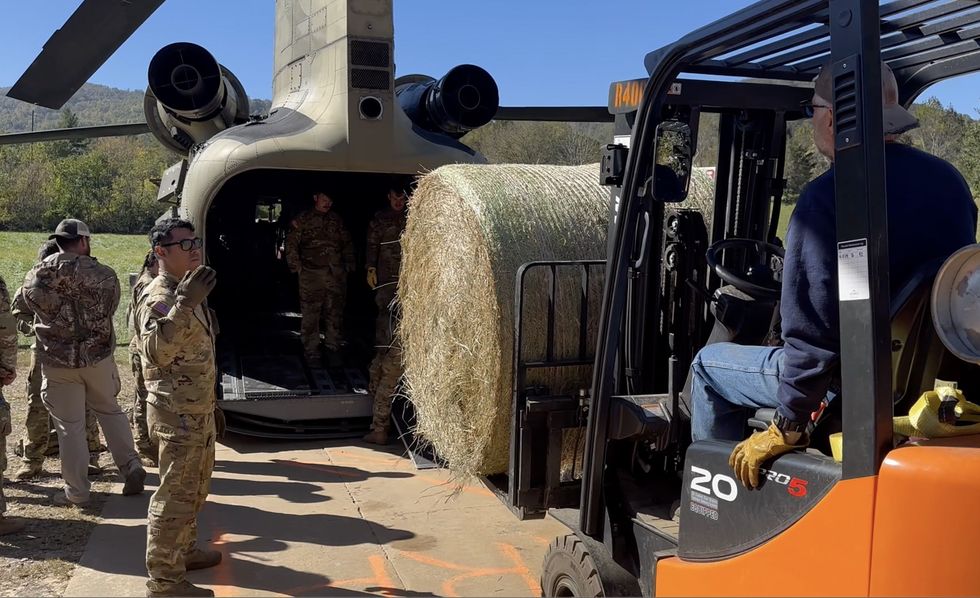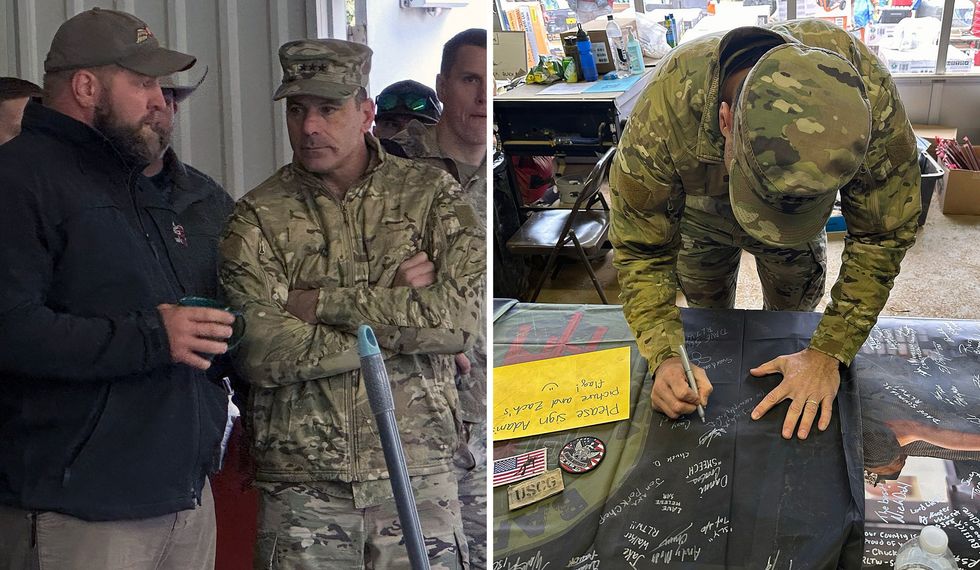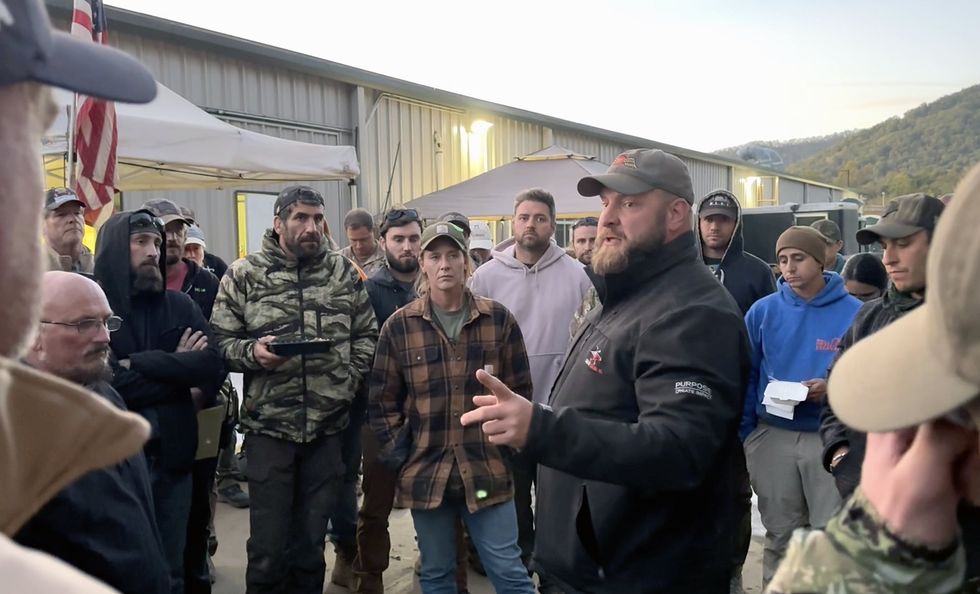Veterans put special ops experience to work helping hurricane-hit North Carolinians
SWANNANOA, North Carolina — A group of former special forces operators who converted the local Harley-Davidson motorcycle dealership into a hurricane-relief supply depot is working so efficiently supplying aid to mountain communities that it drew a visit from the commanding general of the U.S. Army’s airborne forces. Lt. Gen. Chris Donahue of the XVIII Airborne Corps from Fort Liberty in Fayetteville, N.C., visited the makeshift Savage Freedoms Relief Operations center on Oct. 15 to see for himself what his commanders had been reporting about the all-volunteer supply chain. “All of the ground force commanders for the the 101st [Airborne] that have been in the area have reported back to General Donahue in their sitreps the effort that this group of volunteers has been doing here in Swannanoa,” said Adam R. Smith, 41, a former Army Green Beret who runs the depot. “Specifically how effective we have been in integrating with them on the ground and and how effective they’ve been in supporting our efforts on the ground,” Smith told Blaze News. Before Smith set up the military-style supply chain under his Savage Freedoms Relief Operations charity, he had to rescue his own family when rains from Hurricane Helene caused devastating floods and mudslides across Western North Carolina in late September. 'This is going to take years.' Smith was in Texas when the massive hurricane moved inland from Florida and rumbled north, inundating the mountainous area around Asheville, North Carolina. His home in Black Mountain is a short distance from the Broad River, so Smith feared his wife, Megan, 40, and 3-year-old daughter, Tove, were killed by the floods. Smith told the Charlotte Observer newspaper that on Sept. 28, a friend flew him by helicopter to his home and they airlifted his family to safety. It was one of the first Hurricane Helene rescue operations in Western North Carolina. The supply-chain nerve center relies on hundreds of volunteers to process a steady stream of humanitarian aid, sort it, pack it, and load it onto military and civilian helicopters, trucks, utility vehicles, and all-terrain vehicles — whatever mode is needed to get food, water, cold-weather gear, generators, and heaters to the most remote parts of Western North Carolina. Smith said there is a pressing need for cold-weather gear and supplies as nightly temperatures dip into the 30s. Financial donations can be directed to the Savage Freedoms website or a GoFundMe page established to support relief efforts. On Oct. 14, crews loaded huge rolls of hay onto a National Guard Chinook CH-47 helicopter that took off from Savage Freedoms Relief Operations. The flight and others like it will help farmers keep their animals alive while they are cut off from the usual modes of delivery. Recent airlift deliveries included livestock feed for cattle, pigs, goats, and chickens. The twin-rotor heavy-lift Chinook is used to ferry tons of supplies per flight and has also been used for rescuing people trapped by floodwaters. Smith said the U.S. Air Force Reserve supplied air traffic control specialists to help manage flights in and out of the depot. That expertise helped secure an official designation for the base as a helicopter landing zone. “They’re basically tactical air traffic controllers,” Smith told Blaze News. “We were directly supported with air reservists, and in so doing, it gave us a really great capacity to not only have better control of the airspace, but we got an official [notice] from the FAA making this an official HLZ [helicopter landing zone] with a dedicated frequency that became our controlled airspace.” The setup has been very efficient. “We’ve run a lot of sorties with a small number of birds,” Smith said. Operations centered at the depot range from humanitarian relief that goes out by air and ground to specially trained cadaver dogs that search for human remains in the mud and debris. A medical team does wellness checks on local residents and writes or arranges prescription medications “to make sure that people have what they need and can continue to live,” Smith said. Adam Smith (L) of Savage Freedoms Relief Operations gives a tour to Lt. Gen. Chris Donahue, commanding general of the XVIII Airborne Corps, at the hurricane relief depot in Swannanoa, North Carolina, on Oct. 15, 2024. Donahue (R) autographs a photo and flag at the operations center.Photos by Steve Baker/Blaze News Smith’s operation has an intelligence section that scrapes social media to find leads on people needing help and an operations group that confirms where help is needed and schedules transport. A community outreach team is working on providing potable water for schools and assisted living facilities. “We go out and vet information. Once the information is vetted, then it comes back and either goes to a ground operation or air operation,” he said. “We build pre-specified supply packages, and then once we get


SWANNANOA, North Carolina — A group of former special forces operators who converted the local Harley-Davidson motorcycle dealership into a hurricane-relief supply depot is working so efficiently supplying aid to mountain communities that it drew a visit from the commanding general of the U.S. Army’s airborne forces.
Lt. Gen. Chris Donahue of the XVIII Airborne Corps from Fort Liberty in Fayetteville, N.C., visited the makeshift Savage Freedoms Relief Operations center on Oct. 15 to see for himself what his commanders had been reporting about the all-volunteer supply chain.
“All of the ground force commanders for the the 101st [Airborne] that have been in the area have reported back to General Donahue in their sitreps the effort that this group of volunteers has been doing here in Swannanoa,” said Adam R. Smith, 41, a former Army Green Beret who runs the depot.
“Specifically how effective we have been in integrating with them on the ground and and how effective they’ve been in supporting our efforts on the ground,” Smith told Blaze News.
Before Smith set up the military-style supply chain under his Savage Freedoms Relief Operations charity, he had to rescue his own family when rains from Hurricane Helene caused devastating floods and mudslides across Western North Carolina in late September.
'This is going to take years.'
Smith was in Texas when the massive hurricane moved inland from Florida and rumbled north, inundating the mountainous area around Asheville, North Carolina. His home in Black Mountain is a short distance from the Broad River, so Smith feared his wife, Megan, 40, and 3-year-old daughter, Tove, were killed by the floods.
Smith told the Charlotte Observer newspaper that on Sept. 28, a friend flew him by helicopter to his home and they airlifted his family to safety. It was one of the first Hurricane Helene rescue operations in Western North Carolina.
The supply-chain nerve center relies on hundreds of volunteers to process a steady stream of humanitarian aid, sort it, pack it, and load it onto military and civilian helicopters, trucks, utility vehicles, and all-terrain vehicles — whatever mode is needed to get food, water, cold-weather gear, generators, and heaters to the most remote parts of Western North Carolina.
Smith said there is a pressing need for cold-weather gear and supplies as nightly temperatures dip into the 30s. Financial donations can be directed to the Savage Freedoms website or a GoFundMe page established to support relief efforts.
On Oct. 14, crews loaded huge rolls of hay onto a National Guard Chinook CH-47 helicopter that took off from Savage Freedoms Relief Operations. The flight and others like it will help farmers keep their animals alive while they are cut off from the usual modes of delivery. Recent airlift deliveries included livestock feed for cattle, pigs, goats, and chickens.
The twin-rotor heavy-lift Chinook is used to ferry tons of supplies per flight and has also been used for rescuing people trapped by floodwaters.
Smith said the U.S. Air Force Reserve supplied air traffic control specialists to help manage flights in and out of the depot. That expertise helped secure an official designation for the base as a helicopter landing zone.
“They’re basically tactical air traffic controllers,” Smith told Blaze News. “We were directly supported with air reservists, and in so doing, it gave us a really great capacity to not only have better control of the airspace, but we got an official [notice] from the FAA making this an official HLZ [helicopter landing zone] with a dedicated frequency that became our controlled airspace.”
The setup has been very efficient. “We’ve run a lot of sorties with a small number of birds,” Smith said.
Operations centered at the depot range from humanitarian relief that goes out by air and ground to specially trained cadaver dogs that search for human remains in the mud and debris. A medical team does wellness checks on local residents and writes or arranges prescription medications “to make sure that people have what they need and can continue to live,” Smith said.
 Adam Smith (L) of Savage Freedoms Relief Operations gives a tour to Lt. Gen. Chris Donahue, commanding general of the XVIII Airborne Corps, at the hurricane relief depot in Swannanoa, North Carolina, on Oct. 15, 2024. Donahue (R) autographs a photo and flag at the operations center.Photos by Steve Baker/Blaze News
Adam Smith (L) of Savage Freedoms Relief Operations gives a tour to Lt. Gen. Chris Donahue, commanding general of the XVIII Airborne Corps, at the hurricane relief depot in Swannanoa, North Carolina, on Oct. 15, 2024. Donahue (R) autographs a photo and flag at the operations center.Photos by Steve Baker/Blaze News
Smith’s operation has an intelligence section that scrapes social media to find leads on people needing help and an operations group that confirms where help is needed and schedules transport. A community outreach team is working on providing potable water for schools and assisted living facilities.
“We go out and vet information. Once the information is vetted, then it comes back and either goes to a ground operation or air operation,” he said. “We build pre-specified supply packages, and then once we get the thumbs-up, the supply packages get loaded into helicopter or on a ground vehicle, and then it gets pushed out to that location.”
The extensive military experience of most of the volunteers has helped the depot integrate with various U.S. military assets and personnel around North Carolina, Smith said.
“At this point, the fluidity of effort and the efficiency by which we’ve been able to mesh with the National Guard units, the air reserve units, and the active-duty units has been one of the principal reasons why we’ve been so effective utilizing [military air support], getting materials and supplies where they need to go,” he said.
Elements from the 101st Airborne Division and the 82nd Airborne Division have been active in North Carolina disaster relief. Both are part of the XVIII Airborne Corps under the command of Gen. Donahue.
More than 11,000 National Guard members are at work in a half-dozen states helping with recovery from Hurricane Helene and Hurricane Milton, according to the National Guard Bureau. More than 3,600 Guard members from 15 states are tasked with Hurricane Helene relief.
Maj. Gen. Ronald Win Burkett II, National Guard Bureau director of domestic operations and force development, said more than 750 people have been rescued by Guard personnel in North Carolina alone, including 219 extracted by hoist to hovering helicopters.
 Adam Smith of Savage Freedoms Relief Operations addresses volunteers at a makeshift supply depot at the Harley-Davidson dealership in Swannanoa, North Carolina, Oct. 15, 2024.Photo by Steve Baker/Blaze News
Adam Smith of Savage Freedoms Relief Operations addresses volunteers at a makeshift supply depot at the Harley-Davidson dealership in Swannanoa, North Carolina, Oct. 15, 2024.Photo by Steve Baker/Blaze News
One of the more pressing duties in recent days has been rumor control and disinformation. Smith and some of his leaders set out to contact every church and relief group in Buncombe County to ensure that they know how to request aid and to caution them to be on the watch for scammers looking to steal or hijack supplies.
The personal communications also help to dispel rumors that operations like Savage Freedoms are part of some anti-government militia.
Smith said the devastation brought by Hurricane Helene is staggering.
“The amount of devastation is so much bigger than is being reported by the national news media,” he said. “And this message and the idea that everybody is A-OK is simply not true. The reconstruction effort is not going to take one week or two weeks or a month or two months. This is going to take years.”
Smith has extensively supported Savage Freedoms Relief Operations with his own funds. He said he trusts that God will help him “see a way out of it.”
“We spent all of our own money, all of our own savings,” Smith said. “As far as this goes, this could either make us or break us, and right now, financially it’s hurting.
“But I think if we continue to say yes to God and we continue to do God’s work and we just don’t put fear in our hearts, then I think he’ll provide.”
Like Blaze News? Bypass the censors, sign up for our newsletters, and get stories like this direct to your inbox. Sign up here!
Originally Published at Daily Wire, World Net Daily, or The Blaze
What's Your Reaction?

































































































